Peace and Nonviolence
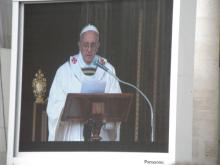
Pope Francis on Thursday told world leaders gathered in Russia for the G-20 summit that a military intervention in Syria would be “futile,” urging them to focus instead on dialogue and reconciliation to bring peace to the war-torn country.
The Argentine pontiff’s first major foray onto the global stage comes as the U.S. Congress prepares to vote on a military strike against Syria in response to a reported chemical weapons attack outside Damascus on Aug. 21.
For Francis, just six months on the job, the Syria question will test his ability to summon the power of his global bully pulpit and could play a major role in shaping the global image of a man who’s drawn more attention for his down-to-earth pastoral appeal.
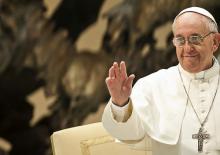
We learned the story in Sunday School.
Jesus and his inner circle — Peter, the rock, and James and John, the sons of thunder — came down from the Mount of Transfiguration and found the disciples facing their own inability to cast an unclean spirit out of a young boy. Annoyed with the disciples, Jesus says to the father: “If you believe, all things are possible to him who believes.” (Mark 9:23) The father replies: “Lord, I believe; help my unbelief.” (Mark 9:24) Jesus casts out the unclean spirit. Later, when the disciples ask why they were unable to do it, Jesus says that some only come out through prayer and fasting.
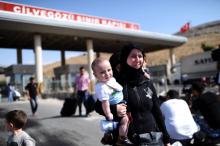
When a head of state is responsible for the deaths of 100,000 of his people and has used chemical weapons against innocent civilians — the world needs to respond. In one massive attack, the evidence appears to show that 1,429 people, including 400 children, suffered horrible deaths from chemical weapons banned by the international community. That is a profound moral crisis that requires an equivalent moral response. Doing nothing is not an option. But how should we respond, and what are moral principles for that response?
For Christians, I would suggest there are two principles that should guide our thinking. Other people of faith and moral sensibility might agree with this two-fold moral compass.
![Pope Gregory the Great, Carlo Saraceni [Public domain], via Wikimedia Commons Pope Gregory the Great, Carlo Saraceni [Public domain], via Wikimedia Commons](https://sojo.net/files/styles/medium/public/blog/Gregorythegreat.jpg)
As I began my morning devotions on Tuesday this week, Syria was on my mind. No surprise, right? The debate about whether to respond militarily to the use of chemical weapons is all over the news right now. Mostly folks are arguing about what actually happened and the larger geopolitical questions that a military strike involves, which are important and necessary issues. But here’s the question that was rattling around in my head as I turned to the day’s devotional readings on universalis.com: How does one respond to violence without becoming as guilty as the perpetrators you seek to punish?
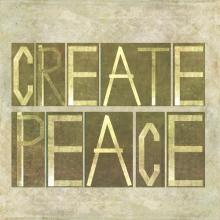
As the United States prepares to “officially” become involved in the Syrian war, Christian pacifism has reemerged as a much-discussed and relevant topic. Unfortunately, the concept has been somewhat misrepresented, undervalued, and often downright demonized within evangelical communities.
Critics often assume Christian Pacifism is some sort of radical political movement associated with marijuana-smoking hippies who are anti-government conspiracy theorists. To make matters worse, pop-culture (and much of Christian culture) has made pacifism seem, well, passive — as if pacifists are unpatriotic and un-American heretics who refuse to enlist in the military and avoid physical confrontations at all costs. They are characterized and perceived as weak, scared, and gutless.
In reality, the beliefs that form Christian pacifism are spiritual and scripturally founded around the life of Christ. And whether you agree with the theology, it’s hard to passively dismiss the Biblical argument for pacifism as some sort of crazy mumbo-jumbo.
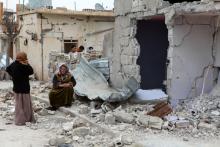
What’s happening in Syria is awful. You see the pictures and your heart breaks. It’s horrific. Lakhdar Brahimi, U.N. special envoy to Syria, said Wednesday that, “With what has happened on the 21st of August last week, it does seem that some kind of substance was used that killed a lot of people: hundreds, definitely more than a hundred, some people say 300, some people say 600, maybe 1,000, maybe more than 1,000.”
The Huffington Post has a slider with the title, Syria War In August (Warning: Graphic Images). Of course, every life matters, but as a father with three young children, seeing the picture of a Syrian man crying out in pain as he carries the body of a young girl – words fail.
Violence and Justice
My wife knows that we promote nonviolence at the Raven Foundation, and that I lean toward pacifism. Wednesday night, as we discussed Syria and Bashar al-Assad’s continued threats of violence, she asked me, “Well, what do we do if a government uses chemical weapons against its own people?”
The question haunts me. These are times that try the soul of anyone committed to nonviolence. We all want justice. We all want the violence to stop. We don’t want any more people to cry in pain as they carry the body of a lifeless child.
And so President Barack Obama seems to be ramping up the war machine. Ironically, as he plans for possible military strikes, on Wednesday he delivered a talk honoring the 50th anniversary of Martin Luther King Jr.’s speech “I Have a Dream.” As we hear the drum beat of war, we are reminded of King’s dream of justice. In his speech King said:
We must not be guilty of wrongful deeds. Let us not seek to satisfy our thirst for freedom by drinking from the cup of bitterness and hatred. … We must not allow our creative protest to degenerate into physical violence. Again and again, we must rise to the majestic heights of meeting physical force with soul force. … [We] will not be satisfied until justice rolls down like water and righteousness like a mighty stream.
Our popular understanding of “justice” is mired with violence. For King, true justice was always based on love and nonviolence, because violence always carries with it a fatal flaw. As he wrote in his book Strength to Love, “Violence brings only temporary victories; violence, by creating many more social problems than it solves, never brings permanent peace” (18).
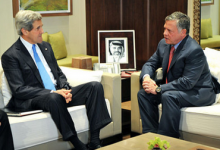
Pope Francis and Jordan’s King Abdullah II reaffirmed that dialogue is the “only option” to end the conflict in Syria, just as the United States and its European allies consider launching a military strike against the regime of President Bashar al-Assad.
The two leaders met for the first time on Thursday at the Vatican. The pontiff and the king, accompanied by his wife Queen Rania, talked in private for 20 minutes.
According to an official Vatican statement, during the meeting “special attention” was given to Syria’s “tragic situation.”
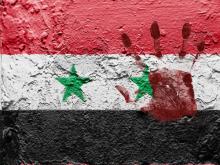
As the Obama administration readies for a probable military strike against Syria, Religion News Service asked a panel of theologians and policy experts whether the U.S. should intervene in Syria in light of the regime’s use of chemical weapons against civilians. Would the “Just War” doctrine justify U.S. military action, and what is America’s moral responsibility? Here are their responses, which have been edited for clarity.
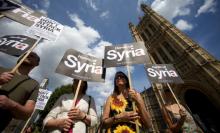
On Wednesday, President Barack Obama said that if Bashar al-Assad used chemical weapons against innocent civilians, there must be “international consequences.” The president is right. But what should those consequences be?
The issue here, again, is one that we have not decided how to deal with: terrorism. The definition of terrorism is deliberate and brutal attacks upon innocent people — whether by individuals, groups, or heads of state. By that definition, Assad is a terrorist. And terrorists who possess weapons of mass destruction and demonstrate their willingness to use them are most dangerous ones. But how should we respond?
I am in in the U.K., where political leaders last night backed off the decision to make immediate “military strikes” while the U.S. and other nations are considering them. The feeling here is that international and legal legitimacy need to be established first, that the U.N. inspectors should finish their examinations in Syria before any actions are taken, and that all other means of response should be fully explored first. These are good decisions.
Why is there such public “war fatigue” in the U.K. and the U.S. in light of Iraq and Afghanistan — and why is that creating reluctance to more military action? Because wars and military solutions have FAILED in response to terrorism — failed to achieve what they were purported to do.
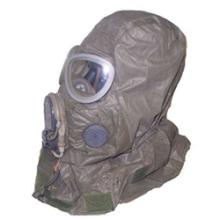
Fearful that Syria might retaliate against Israel if the U.S. launches a military strike, Orthodox Jews and others are demanding the Israeli government distribute gas masks that will fit over their beards.
In recent days, as Orthodox Jews and other bearded men have gone to distribution centers to retrieve their protective hood-like gas masks, they learned the government has only a limited supply, earmarked solely for the elderly and people with breathing problems.
Demand for protective hoods — as well as standard-issue gas masks — has soared since the U.S. administration confirmed that Syrian civilians were killed last week by chemical weapons.
As Ramzi Kysia writes in "The Song Remains" (Sojourners, August 2013), after decades of work, Kathy Kelly’s commitment to peace and nonviolence remains strong. When Sojourners editorial assistant, Dawn Araujo, caught up with her in June, Kelly was between visits to Afghanistan and her work with the Afghan Peace Volunteers. She was spending her “down” time protesting drones, nuclear weapons, and organizing a U.S.

As Syrian President Bashar al-Assad uses chemical weapons at the outskirts of Damascus and President Obama mulls a U.S. military response, some theologians hope for an alarming endgame to the 30-month-long Syrian conflict.
For these Christians and Muslim, the civil war in Syria heralds nothing less than the Second Coming of Jesus Christ.
Before you label the premise as a conspiracy theory, consider that there are a number of Muslim videos and several Christian websites — not to mention conservative talk radio shows — all making promoting versions of this unfortunate connection. And that’s wrong.

The 18 beauty pageant finalists on stage at Haifa’s basketball stadium wear lovely gowns, their jewelry glitters, and their hair is thick with hairspray.
Unlike typical beauty contestants, the Israeli women standing before a crowd of 2,000 are ages 70 to 94. And all of them experienced the Holocaust.

“Blessed are the peacemakers, for they will be called the sons [and daughters] of God.” Matthew 5:9
The news cycle, the blogosphere, and social justice advocates often focus upon crisis, tragedy, and pain. Moments of freedom, of healing and hope are often drowned out by the cacophonous sounds of self-interest, fear and danger. Today I’d like to silence that cacophony and trumpet loudly about the brave and humble Antoinette Tuff, a peacemaker filled with the Spirit of God, who faced a gunman with her arsenal of love and compassion and saved a school full of children.
Antoinette Tuff’s faith and courage changed the outcome of history on Tuesday, Aug. 20. It is a day that will not live in infamy. Unlike other days that started on a similar path to violence, families did not grieve the loss of their children to the would-be mass gunman who walked into an elementary school with almost 500 rounds of ammunition. Police were scrambled to the scene, but did not have to evacuate classrooms of frightened children watching for a shooter. In fact, despite the heavily armed suspect and a heavily armed law enforcement response, not one person lost their life.
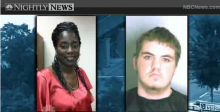
As a teacher, I tend to change the channel or radio station when the news turns to issues related to schooling and education. It is difficult to listen to people discuss aspects of my daily experience as if they were a part of it. When a news story involves an act of violence in a school or a natural disaster wreaking devastation on children and school employees, I am almost less likely to listen. It is too painful to think about what that would be like for me, my colleagues, and most importantly, my students.
When major news networks began playing a recording of suburban Atlanta school employee Antoinette Tuff’s 911 call reporting a shooter in her school’s building on Tuesday, I almost turned off the TV. Then, I heard Tuff’s calm voice interacting with the shooter as though as he was any distraught child in the office needing extra attention. I started to listen.

Upon my recent return from the Middle East (with The Global Immersion Project), I was struck more than ever before at our Western infatuation around military aggression, violence, and division. Not only are these the primary narratives we are fed through our major media outlets, they are the narratives we subconsciously embrace through the latest bestseller, box office hit, or video game. Violence, death, and division have become normative. We are becoming numb to the very things that we – as ambassadors of hope and reconciliation – are to turn from as Resurrection People. It is as though there is a stranglehold on our on our ability to see and participate in the stories of healing and new life.
As surprising as this may be, embedded in the midst of these conflicts are endless stories of hope that never make the latest headline or sound bite. And in the times I've followed Jesus INTO these places of conflict, I continue to encounter stories of peace and hope that embody the Gospel message, stories by real people, happening right now, in places usually known only for conflict, violence, and death.
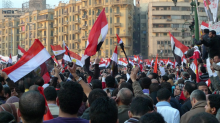
Nelson Mandela, the first democratically elected president of South Africa, has been in the hospital for more than two months. Nearly 20 years after his election South Africa remains, despite myriad troubles, a stable, multiracial, and democratic country.
Mohamed Morsi, the first democratically elected president of Egypt after the world-changing protests in Tahrir Square led to the resignation of former president Hosni Mubarak, has been out of office, by way of military coup, for more than one month. He is now being held by the military under house arrest at an undisclosed location, and the mere mention of his name divides the citizens of Egypt. This division has led to the death of more than five hundred Morsi supporters this week alone. In response, members of the Muslim Brotherhood and Morsi supporters have attacked dozens of Coptic Christian Churches.

Since the July 3 ousting of former president Mohammed Morsi, Christians in Egypt have faced a shocking spike in violent attacks. Human rights groups in the country claim that to date, Egyptian authorities have not prevented the persecution.
Christians make up nearly one-tenth of Egypt's population of 80 million. While Egypt's Coptic Christians have faced longstanding persecution, many are reporting that tensions between Sunni Muslims and minority Christians are the highest they have been for decades. USA Today reports:
Churches, houses, monasteries, orphanages, schools and businesses belonging to Copts were attacked in nine provinces "causing panic, losses and destruction for no reason and no crimes they committed except being Christians," the Maspero Youth Union, a Coptic activist group, said Thursday.
Youssef Sidhom, editor-in-chief of the Christian weekly Watani, said the recent attacks are painful and vicious but it be worse if they are allowed to divide the two faiths.
USA Today has created an interactive map with real-time updates on attacks on Christian institutions, stretching from Alexandria to Qena. View the map here.
Read more of USA Today's story here.

Christian ethicist Jean Bethke Elshtain, a scholar who shaped national conversations on war and peace from her perch at the University of Chicago, died Sunday at age 72.
She had two heart attacks in 2012 and, according to the school, she had another “cardiac incident” earlier this summer that led to her death.
The widely admired political philosopher regularly wrote and lectured on ethics, politics, and religion. She defended American military intervention in Iraq and Afghanistan using “just war theory,” a position that suggests there are times when it is necessary and perhaps right to go to war.
When a hundred scholars and ethicists signed a petition that read, “As Christian ethicists, we share a common moral presumption against a preemptive war on Iraq by the United States,” Elshtain argued the opposite, publishing the book Just War Against Terror in 2003.
On Monday, a federal judge in New York found the state's stop-and-frisk policies to be unconsitutional racial profiling. The same day, Attorney General Eric H. Holder Jr. announced that federal prosecutors would no longer invoke mandatory minimum sentencing laws for low-level drug offenses.
Together, the two decisions sent strong signals that the country is moving away from the tough-on-crime policies of the last generation. The New York Times reports:
A generation ago, amid a crack epidemic, state and federal lawmakers enacted a wave of tough-on-crime measures that resulted in an 800 percent increase in the number of prisoners in the United States, even as the population grew by only a third. The spike in prisoners centered on an increase in the number of African-American and Hispanic men convicted of drug crimes; blacks are about six times as likely as whites to be incarcerated.
“There was the thought that if we stop, frisk, arrest and incarcerate huge numbers of people, that will reduce crime,” Rudovsky said. “But while that may have had some effect on crime, the negative parts outweighed the positive parts.”
Read more here.